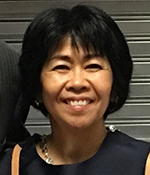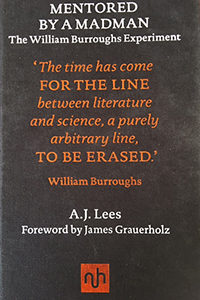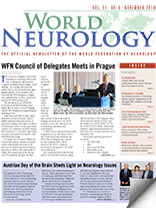
Yuri Takeuchi, MD
By Yuri Takeuchi, MD
A mentor is a preceptor who imparts wisdom and shares knowledge with less experienced colleagues. During medical training, it is customary to have a teacher who guides the future physician in approaching patients with the right clinical tools, bedside manner, and generosity that characterizes a good physician.
In the first chapters of his autobiographical book, Mentored by a Madman: The William Burroughs Experiment, Professor Andrew J. Lees, MD, a neurologist known worldwide for his contributions to the understanding and treatment of Parkinson´s disease and other movement disorders, describes his early beginnings as a brilliant medical student at London’s Hospital Medical College in Whitechapel. The memories of those first years in medical school will be shared by all of those who have had the illusion of becoming a physician. Regardless of the person who serves as role model for young medical students, it was evident to young Lees that the doctor-patient relationship is always unbalanced, given that the God-like physician always knows what is best for the “unschooled” patient.
 As a sixth-grade child, the future Dr. Lees was introduced to the work of Richard Spruce, an American biologist who may be considered the father of modern ethnobotany. They shared a “passion for grasses and trees” and Spruce’s descriptions “left me with an indelible impression of the convulsive beauty of the forest … he also hinted in this logbooks that the plants of the rainforest held most of the secrets to understanding and manipulating the chemical systems of the human brain.”
As a sixth-grade child, the future Dr. Lees was introduced to the work of Richard Spruce, an American biologist who may be considered the father of modern ethnobotany. They shared a “passion for grasses and trees” and Spruce’s descriptions “left me with an indelible impression of the convulsive beauty of the forest … he also hinted in this logbooks that the plants of the rainforest held most of the secrets to understanding and manipulating the chemical systems of the human brain.”
Dr. Lees tells us about Spruce’s narrative of his experience during the “Feast of Gifts” of the native tribes, a ceremonial event that included the ritual drinking of the “caapi” brew. Spruce collected some fresh specimens of the liana Banisteriopisis caapi, the source of yagé, that were sent to the Royal Botanical Gardens at Kew for classification and analysis in 1853.
In 1952, William Burroughs read about yagé, also known as ayahuasca, “the vine of the soul,” used by the natives for its prophetic and clairvoyance properties. In 1953, in Bogotá, Colombia, Burroughs met the charismatic Dr. Richard Schultes. Schultes introduced Burroughs to the yagé ceremonies. Dr. Lees describes that Burroughs “had glimpsed a supernatural state of being that provided him with a gateway into a proximate closed-off past.” He began a series of scientific investigations and published in the British Journal of Addiction a paper informing that the mixture of Banisteriopsis caapi with the leaves of Psychotria viridis or chacrona is responsible for the psychedelic effect of yagé.
As a confession in the book, Dr. Lees tells us of his experiences with L-Dopa and selegiline, two medications used in the treatment of Parkinson´s disease and, at his mid-60s, his journey to the Colombian Amazon forest to meet the native Indians and to experience the visions induced by the yagé ceremonies. The vivid descriptions of those self-experimental experiences by “a man of many quests,” as described by Raymond Tallis in the recent review of the book in Brain, are the most personal and intimate part of this autobiographical book.
Ethnopharmacology’s aim, as described by its international society, is the discovery of a wealth of useful therapeutic agents in the plant and animal kingdoms; the empirical knowledge of these medicinal substances, and of their toxic potential passed on by oral tradition, sometimes recorded. Many valuable drugs (e.g., morphine, taxols, physostigmine, quinidine, emetine) were found as prototypes in the attempts to develop more effective and less toxic medicines.
Dr. Lees’ message is to open our minds and show respect for nontraditional medicines and, with a strong scientific basis, to listen to our patients because those who suffer the terrible burden of neurological diseases have a sixth sense. We, as understanding physicians, should pay more attention to the voice of rainforest medicine. Perhaps, if we drink “the vine of the soul,” we might find promising alternative medicines to relieve the suffering of our fellow human beings.
